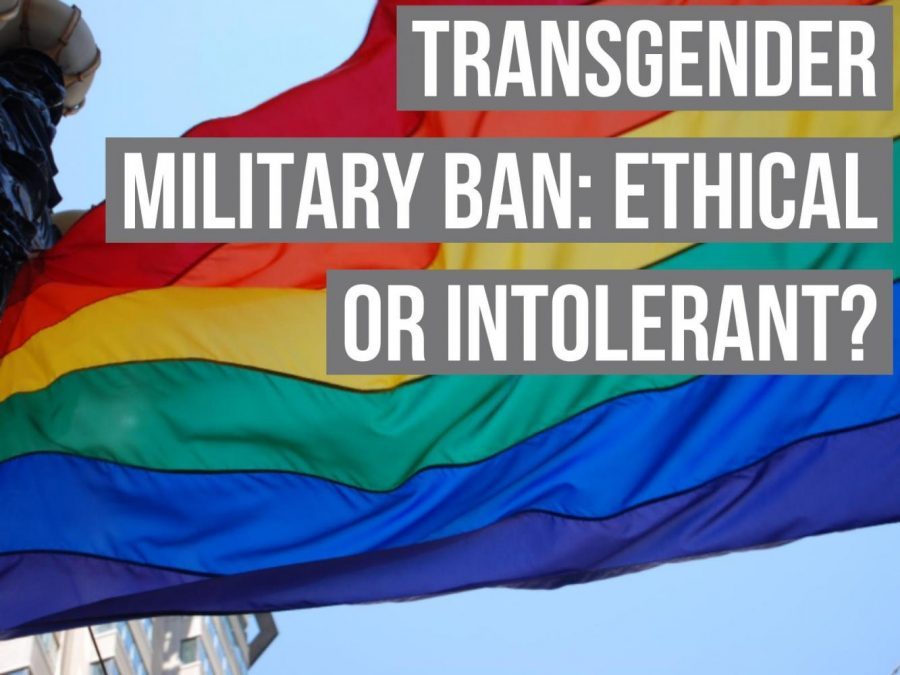The line between discrimination and logic is unclear
Photo by Adobe Spark
August 2, 2017
It seems the president loves using twitter more than I do. Or than any other teenager, which is troubling. No doubt, what is even more unnerving, is when I logged onto twitter last Wednesday morning to see the following tweets:
“After consulting with my Generals and military experts, please be advised that the United States government will not accept or allow transgender individuals to serve in any capacity in the US military. Our military must be focused on decisive and overwhelming victory and cannot be burdened with the tremendous medical costs and disruption that transgenders in the military would entail.”
It didn’t give me a sense of pride. Or relief. Or anything close to happiness. No, it only left me with a sense of profound confusion and worry. I am only 17-years-old, still trying to navigate the realms of politics and personal beliefs, but it doesn’t take a genius to see that President Trump’s sporadic announcements through the usage of social media aren’t exactly comforting.
On the other side of the coin, I think I am pretty decisive when it comes to matters such as the military, and the security of our country. No citizen has a right to enlist in the military; it is unquestionably a privilege. The military does not change to conform to society, but rather the other way around. This ensures the standards and expectations of the American fighting force maintain unabridged solidarity and swiftness when in combat.
There is a difference between being a civilian and a soldier. They are two different things and two complete roles that require extensive attention. Once a civilian becomes a soldier, you are no longer entitled to the same guidelines as a non-combatant, you are supposed to adhere completely to the acts and guidelines of the military and under no circumstances are you allowed to deviate. The military does not bend over backwards to make sure they are being politically correct: it is a black and white world in contrast to the civilian world, which is coated in shades of grey.
Once a soldier, you are re-taught everything from walking, talking, to even how one dresses. Erect back. Arms by your side. “Yes sir, no ma’am.” boots shined. Shirt tucked in. Hair kempt. Perfect eyesight. Arched feet. No criminal record. You need a stout figure, capable of running two miles under 13 minutes… The list goes on. If the military wasn’t as particular as it was, the United States wouldn’t be the superpower it is today.
However, given this, anybody who decides to sacrifice their life should be respected and honored, no matter one’s identity. Race, ethnicity, age, sexuality, gender, shouldn’t matter; they should be thanked, tenfold. Enlisting in the military is no easy task; it takes a great deal of strength to stand up for your beliefs and your country’s’ beliefs, and an even greater resilience to be able to follow the American flag into combat with nothing but rifle and vest.
So the real question is: what happens to the estimated 2,000-6,000 transgender soldiers already in active service? How will the US government pay tribute to these people who have already given so much? Honorable discharge?
After following the news, no such answers have been given yet, which is concerning, considering such a momentous decision was announced through a mere tweet. There was no press conference, no previous discussion, no warning that such movements would soon begin taking place.
Despite just last year, President Trump also tweeted:
Thank you to the LGBT community! I will fight for you while Hillary brings in more people that will threaten your freedoms and beliefs.
— Donald J. Trump (@realDonaldTrump) June 14, 2016
It is unsettling to see such backpedaling, and it definitely fuels the rise of hysteria and outrage between the two political parties, as if our country needed another reason to be divided.
Nevertheless, we also have to look at the facts: the suicide rate among veterans and transgender individuals remain the highest out of any other faction or group. With 41 percent of transgenders and over 32 percent of veterans attempting suicide, putting these two together in a war zone sounds not only terrifying, but cruel.
Moreover, there’s concern over President Trump’s reasoning for the ban, stating that the military cannot be “burdened with the tremendous medical costs and disruption” that transgender personnel would bring. A study completed by the Rand Corporation assesses that only few transgender soldiers actually pursue reassignment surgery, but that this avenue would unfortunately limit their ability to deploy. The cost of such medical services would range anywhere from 2.4 million to 8.4 annually. The military budget should be concerned with buying M16’s and fighter planes like F-18’s, rather than cosmetic surgeries that should be paid for at one’s own expense and be completed either before entry into the military or after active service.
I wholeheartedly believe anyone willing to sign up for the military should be held in high regard. However, individuals who have already undergone reassignment surgery propose a risk just as much as someone who has had hip replacement. Thousands of men and women are turned away, simply for having flat feet, or scoliosis. This is done not because of discrimination, or prejudice, but simply because the risk is too high to take- especially in a warzone.
Taxpayer money should be focused toward providing care to those who have already served, and to give them rehabilitating services geared with helping them acclimate back to civilian life. Most veterans will sustain depression, anxiety, Post Traumatic Stress Disorder and many other psychological and even physical problems far after the fight is over; it is crucial that we show those who have sacrificed our gratitude.
In 2011, the US repealed its “Don’t Ask, Don’t tell” stature, a policy enacted by the Clinton Administration in the 90s. This ended the LGBT community’s silence in the military; they were now able to openly serve without retribution or consequence. The LGBT population has had victory after victory, and has now reached a place of equal footing. I hope that with the new president, these achievements would remain intact. Factors like sexuality shouldn’t matter when it comes time to decide if one is able to enlist. Standards should reside solely on physical and mental capability, and nothing more.















